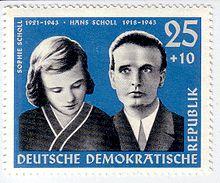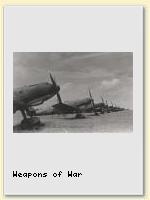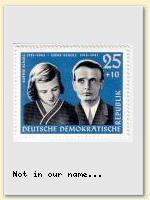
Students who took a stand…Hans and Sophie Scholl
Founded in June 1942, the White Rose were a small group of non-violent protestors; followers of their conscience and resistors to Hitler’s Nazi barbarity. A group of young students, some of whom had seen at first hand the brutality on the Russian front and in Poland, they published five anti-Nazi leaflets, distributing thousands in Munich, Stuttgart, Cologne, Vienna, Hamburg, Innsbruck and Berlin.
Hans and Sophie Scholl were caught as they left leaflets in Munich University on 18th of February 1943, and handed over to the Gestapo for interrogation. Indicted for treason, they were tried four days later, along with Christoph Probst who had played a part in the production of the leaflet, found guilty and executed by guillotine that same day.
The remaining activists of the White Rose group were rounded up. Five were executed. Other members, supporters and sympathisers were sentenced to prison terms ranging from six months to ten years.
Their final leaflet, produced after the German Army’s defeat at Stalingrad, called on German citizens:
"Support the resistance movement!" in the struggle for "freedom of speech, freedom of religion and protection of the individual citizen from the arbitrary action of criminal dictator-states".
Their pleas to the German people to resist lived on. One of their leaflets was smuggled out of Germany, and the Allies made millions of copies and air-dropped them over Germany.

A Policeman who took a stand…
Kristallnacht, November 9th 1938 is a night that will stand out in history. In reprisal for the assassination of the German Ambassador in Paris by a young Polish Jew, the fury of the state was unleashed against the Jewish people. Initiated by the SA – the Brown Shirts – hundreds of Jewish synagogues throughout Germany and Austria were set on fire by mobs seeking their complete destruction. And, as ordered from above, the police were not to intervene. Intimidation, harassment, destruction of Jewish businesses and looting of homes, hospitals and schools were the sideshow. The attacks left the streets covered with broken glass from the windows of Jewish-owned stores, buildings, and synagogues.
In Emben, eighty-year-old residents of a Jewish old folks home were driven out into the street in their nightclothes, marched down to where their synagogue was already in flames, and made to perform physical exercises in the road in front of the flaming building. Such was the wanton brutality that night.
The Times wrote at the time: “No foreign propagandist bent upon blackening Germany before the world could outdo the tale of burnings and beatings, of blackguardly assaults on defenseless and innocent people, which disgraced that country yesterday.”
Not everywhere was there such disgrace. The police of Berlin’s 16th division were not prepared to stand aside when the synagogue on Oranienburgerstrasse was threatened. Senior Lieutenant Wilhelm Kruzfeld, along with fellow officer Otto Belgart, instead refused the mob, standing firm and drawing his pistol, invoking his responsibility to enforce a law protecting historic buildings, and bringing in the firefighters to save the building and rescue its contents from destruction.
Later Willhelm Kenzel would be taken to task by his police chief… but when it counted he stood firm.

A journalist who took a stand…
Carl von Ossietzky was no stranger to standing up to authority. He was no friend of the regime and for publishing articles and reports critical of the state had spent time in prison before Hitler came to power. A socialist, a pacifist and editor-in-chief of Die Weltbühne (The World Stage), he was prepared to publish material from an insider about the underhand ways in which re-armament was secretly being pursued, in direct contravention of the post-WWI impositions in the treaty of Versailles.
A constant thorn in Hitler’s side, with his warnings against militarism and rise of the Nazi Party, he would be dealt with in the aftermath of the fire that swept through the Reichstag on the night of 27 February 1933. Blamed on the Communists, it served as the excuse for Hitler to take them and suspected fellow travellers off the streets, and in the end be banned. Carl von Ossietzky, with his openly expressed dissident views, was first imprisoned, then moved to a concentration camp where he was mercilessly mistreated.
The International Red Cross representative allowed to visit him in November 1935 found "a trembling, deadly pale something, a creature that appeared to be without feeling, one eye swollen, teeth knocked out, dragging a broken, badly healed leg . . . a human being who had reached the uttermost limits of what could be borne."
Elsewhere in the world, friends and colleagues had sought his nomination for the Nobel Peace Prize, which to the fury and frustration of the Nazi regime was awarded him in 1936. Moved to hospital that year he eventually died in 1938 from the tuberculosis which had been untreated while he was a prisoner in the Esterwegen concentration camp.
Heinrich Mann wrote of the award of the Nobel prize: "in one moment the conscience of the world arose, and the name which it spoke was his."
Four who had the courage to stand…
What they all stood against was the absolute power of Hitler to determine how life would be in the Third Reich. His 2,000,000 strong army of SA ‘Brownshirts’ enforced his wishes with a random and wanton violence that ensured they were obeyed, and often regardless of what had been decreed. Sophie Scholl spoke for all when, during the course of her trial, she is reported to have said of the stand taken against Hitler by 'White Rose',
‘Somebody, after all, had to make a start.’


 Beyond the Book
Beyond the Book






